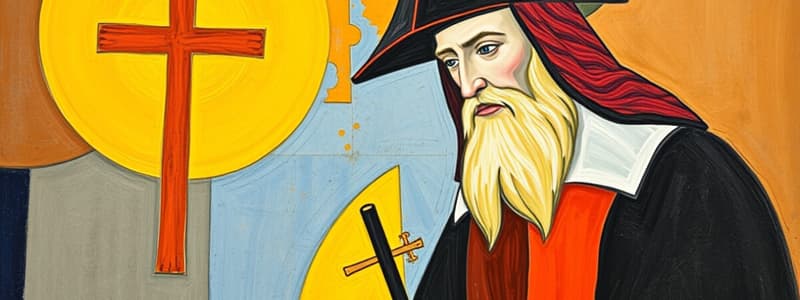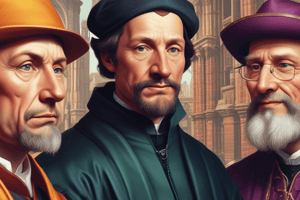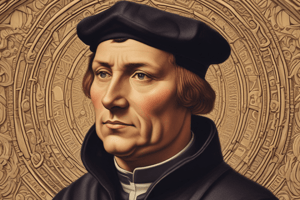Podcast
Questions and Answers
What significant reform did Zwingli implement in Zurich regarding worship practices?
What significant reform did Zwingli implement in Zurich regarding worship practices?
- Simplification of liturgy and removal of relics (correct)
- Incorporation of more images in worship
- Introduction of new hymns and prayers
- Reinforcement of traditional mass practices
What was Zwingli's view on the Eucharist?
What was Zwingli's view on the Eucharist?
- It is a symbolic act rather than real presence (correct)
- It is predominantly a communal meal for believers
- It should only be administered to the clergy
- It is a means of grace imparting God's presence
Which of the following best describes Zwingli's approach to reform in Zurich?
Which of the following best describes Zwingli's approach to reform in Zurich?
- It focused on quick reform through civic authority (correct)
- It aimed for immediate acceptance without community involvement
- It involved an emphasis on traditional values
- It was gradual and involved much dialogue
How did Zwingli's beliefs about God differ from those of Luther?
How did Zwingli's beliefs about God differ from those of Luther?
What theological concept did Zwingli adopt that reflects humanist influence?
What theological concept did Zwingli adopt that reflects humanist influence?
In what way did Zwingli's political engagement differ from Luther's?
In what way did Zwingli's political engagement differ from Luther's?
Which of the following best describes Zwingli's view on moral ethics?
Which of the following best describes Zwingli's view on moral ethics?
Which legacy did Zwingli leave that influenced later Protestant reformers?
Which legacy did Zwingli leave that influenced later Protestant reformers?
What was one of the main causes of the rebellion linked to societal issues?
What was one of the main causes of the rebellion linked to societal issues?
Which event influenced the Munsterite Rebellion despite taking place before it?
Which event influenced the Munsterite Rebellion despite taking place before it?
What was a significant outcome of the rebellion following its suppression?
What was a significant outcome of the rebellion following its suppression?
How did the Munsterite Rebellion impact the sense of nationalism in Ireland?
How did the Munsterite Rebellion impact the sense of nationalism in Ireland?
Which movement was influenced by the legacy of the Munsterite Rebellion?
Which movement was influenced by the legacy of the Munsterite Rebellion?
Who was a prominent leader associated with the Munsterite Rebellion?
Who was a prominent leader associated with the Munsterite Rebellion?
What did many local leaders do during the Munsterite Rebellion?
What did many local leaders do during the Munsterite Rebellion?
What resulted from the martyrdom of key leaders in the rebellion?
What resulted from the martyrdom of key leaders in the rebellion?
What was a significant cause of the Munster Rebellion?
What was a significant cause of the Munster Rebellion?
Which figure succeeded Jan Matthys as leader of the Munster Rebellion?
Which figure succeeded Jan Matthys as leader of the Munster Rebellion?
What was one key theological belief emphasized by the Anabaptists during the Munster Rebellion?
What was one key theological belief emphasized by the Anabaptists during the Munster Rebellion?
What was one of the outcomes of the brutal suppression of the Munster Rebellion?
What was one of the outcomes of the brutal suppression of the Munster Rebellion?
How did the Munster Rebellion compare to the Peasants' War?
How did the Munster Rebellion compare to the Peasants' War?
What led to a negative perception of Anabaptists as a result of the rebellion?
What led to a negative perception of Anabaptists as a result of the rebellion?
Which of the following describes John of Leiden's rule during the Munster Rebellion?
Which of the following describes John of Leiden's rule during the Munster Rebellion?
What was one major ideological difference between the Anabaptists and the Protestant reformers during this period?
What was one major ideological difference between the Anabaptists and the Protestant reformers during this period?
Flashcards are hidden until you start studying
Study Notes
Reformation History
- Ulrich Zwingli was a key figure in the Protestant Reformation alongside Martin Luther.
- He initiated the Reformation in Zurich, Switzerland, around the same time as Luther in Germany (early 16th century).
- Zwingli's movement emphasized scripture over tradition, leading to significant changes in worship practices.
Zurich In The Reformation
- Zurich became a center for the Reformation under Zwingli's leadership.
- Zwingli began preaching in 1519, leading to the establishment of a reformist agenda.
- Major reforms included the removal of images and relics, simplification of liturgy, and promotion of communion in both kinds (bread and wine).
- The Zurich city council supported Zwingli, implementing reforms across the city.
Zwingli's Theology
- Zwingli emphasized the authority of Scripture, rejecting any practices not explicitly found in the Bible.
- His theology included:
- Christology: Focus on the humanity and divinity of Christ.
- Sacraments: Viewed the Eucharist as symbolic rather than a means of grace, contrasting with Luther's view of real presence.
- Predestination: Held a belief in predestination, influenced by humanist thought.
- Ethics: Advocated for moral and ethical living based on biblical principles.
Zwingli's Influence On Protestantism
- Zwingli's reforms laid groundwork for future Reformed traditions.
- Influenced later Protestant reformers such as John Calvin.
- His conflict with Anabaptists highlighted different interpretations of faith and practice within the Reformation.
- Established a model for church-state relations, advocating for civic involvement by church leaders.
Comparative Study Of Zwingli And Luther
- Theological Differences:
- Zwingli saw the Eucharist as a symbolic act; Luther believed in the real presence of Christ in the elements.
- Zwingli emphasized the sovereignty of God, while Luther focused on justification by faith.
- Approach to Reform:
- Zwingli sought to reform practices quickly through city governance; Luther advocated for gradual reform through dialogue.
- Political Engagement:
- Zwingli was more involved in political matters and sought to implement reforms through civic authorities.
- Luther maintained a more cautious approach to political engagement, focusing on individual conscience and faith.
- Legacy:
- Zwingli's influence contributed to the formation of the Reformed tradition, while Luther's impact led to the Lutheran tradition.
Reformation History
- Ulrich Zwingli played a crucial role in the Protestant Reformation, paralleling Martin Luther's efforts.
- Initiated reforms in Zurich, Switzerland, in the early 16th century.
Zurich In The Reformation
- Zurich emerged as a Reformation hub under Zwingli's direction.
- Zwingli's preaching began in 1519 and laid the foundation for a reformist agenda.
- Key reforms enacted included:
- Removal of images and relics from churches.
- Simplified liturgy focusing on Scripture.
- Introduced communion in both kinds (bread and wine).
- Support from the Zurich city council was instrumental in implementing these reforms.
Zwingli's Theology
- Emphasized the sole authority of Scripture, dismissing unbiblical practices.
- Key theological points included:
- Christology: Balanced view of Christ’s humanity and divinity.
- Sacraments: Viewed the Eucharist as purely symbolic, opposing Luther’s real presence view.
- Predestination: Adopted a belief in predestination influenced by humanist ideas.
- Ethics: Promoted living a moral life in accordance with biblical principles.
Zwingli's Influence On Protestantism
- Established foundational reforms that shaped future Reformed traditions.
- Influenced key Protestant reformers like John Calvin.
- Conflict with Anabaptists showcased diverse interpretations of faith and practice within the Reformation.
- Advocated for a model of church-state relations, promoting active civic roles for church leaders.
Comparative Study Of Zwingli And Luther
- Theological Differences:
- Zwingli regarded the Eucharist as symbolic; Luther affirmed Christ's real presence.
- Zwingli prioritized the sovereignty of God over the justification by faith emphasized by Luther.
- Approach to Reform:
- Zwingli pursued rapid reforms via city governance; Luther preferred gradual reforms through discussion.
- Political Engagement:
- Zwingli was more politically active, seeking reforms through civic authorities.
- Luther took a cautious stance on political matters, emphasizing individual conscience and faith.
- Legacy:
- Zwingli's work laid the groundwork for the Reformed tradition.
- Luther’s influence fostered the development of the Lutheran tradition.
Causes of the Rebellion
- Land ownership conflicts escalated tensions, particularly between local farmers and landowners.
- Economic hardship, characterized by high rents and declining crop prices, intensified discontent among rural communities.
- Predominantly Catholic population faced discrimination from the Protestant ruling elite, exacerbating sectarian tensions.
- Political disenfranchisement resulted from the absence of local representation in government decisions, fostering feelings of marginalization.
Historical Context
- The rebellion emerged in 19th-century Ireland, a period marked by pervasive poverty and social unrest.
- Influenced by previous uprisings and movements for Irish independence, reflecting long-standing dissatisfaction with British rule.
- Part of the larger Land War movement aimed at addressing grievances related to land ownership and tenant rights.
Outcomes and Consequences
- British forces swiftly suppressed the uprising, leading to severe reprisals against participants.
- Increased governmental repression resulted from the rebellion, with stricter laws limiting freedom of expression for perceived dissenters.
- The rebellion significantly contributed to the rise of Irish nationalism, inspiring subsequent movements for self-governance.
- Martyrdom of key leaders, many executed or imprisoned, galvanized public support for future nationalist efforts.
Subsequent Movements
- The legacy of the rebellion influenced the Home Rule Movement, which aimed for Irish legislative independence.
- Resentment stemming from the rebellion laid the groundwork for the organized resistance that culminated in the Irish War of Independence in the early 20th century.
Key Figures
- John O'Mahony, a prominent leader of the Munsterite Rebellion, symbolized the struggle against British oppression.
- James Stephens played a critical role in the rebellion and later in nationalist movements.
- Various local leaders were instrumental in organizing support, showcasing grassroots involvement in the rebellion.
Historical Context
- Emergence of the Anabaptist movement during the Protestant Reformation in the early 16th century.
- Advocacy for adult baptism and separation from state churches highlighted the movement’s distinct identity.
- Munster, Germany, became a key center for radical Anabaptist beliefs amid socio-economic unrest.
- The Munster Rebellion occurred between 1534-1535, driven by tensions over religious authority and communal living.
Key Figures
- Jan Matthys: Leader of the Munster Rebellion; proclaimed himself a prophet and led the city's takeover.
- John of Leiden: Took leadership after Matthys; declared himself king and enforced strict communal laws, including polygamy.
- Balthasar Hubmaier: Influential Anabaptist leader whose teachings shaped the movement, but not involved in the Munster events.
Theological Implications
- The rebellion underscored radical Anabaptist beliefs regarding church-state separation.
- Introduced the concept of a "New Jerusalem," emphasizing living according to personal biblical interpretations.
- Sparked debates on the use of force for religious purposes, contrasting with more pacifist Anabaptists.
Outcomes and Consequences
- The rebellion was violently quelled in 1535 by Catholic and Protestant forces, resulting in leader and participant executions.
- Created a lasting negative perception of Anabaptists, associating them with fanaticism and violence.
- Led to a strategic shift toward non-violence and political separation, influencing future groups such as the Mennonites.
Comparative Revolts
- The Munster Rebellion differed from the Peasants' War (1524-1525), which focused on broader social reforms rather than radical religious change.
- Both revolts displayed radicalization in response to socio-political pressures, yet they diverged in methods and objectives.
- Contrasts with the English Civil War, where intertwined religious and political conflicts led to different ideologies and outcomes.
Studying That Suits You
Use AI to generate personalized quizzes and flashcards to suit your learning preferences.




